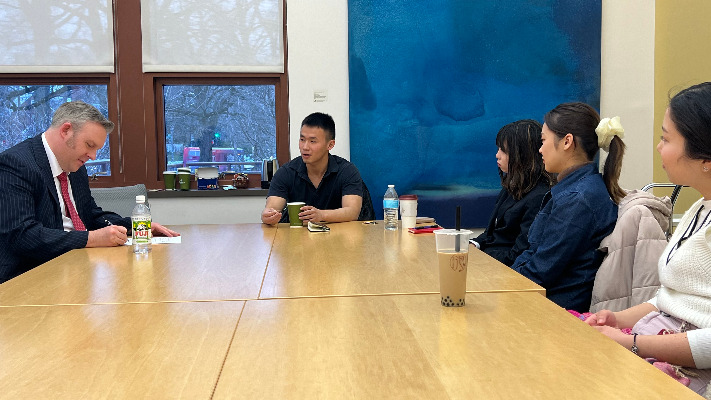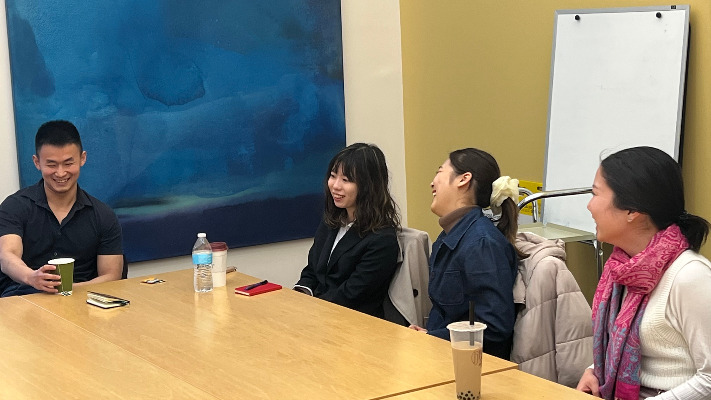Ami Kaibori, Taira Sugimoto, Yoshino Yamauchi and Nodoka Katsura embarked on a trip abroad to study at American University in the United States, and all are doing well. We asked them about their classes and their day-to-day lives (interview by Professor Thomas French, Assistant Dean of JDP).
●What are some of the characteristics of classes at American University? And can you tell us about some of the differences, if any, compared to universities in Japan?
Kaibori: I feel that a major difference is that classes here are much more discussion-based compared to the lecture-based style that is prevalent at Japanese universities. The “Habits of the Mind*” course at American University is probably a good example of this.
* Habits of the Mind is a cultural studies course in which students learn to come up with a clever solution when presented with a problem that has no defined answer.
●What about reading and writing?
Katsura: Of course, we have to read a lot. Only by reading the material are students able to participate in the discussion. There is a large volume of reading in English that must be done before each class.
Yamauchi: As far as writing goes, there is far more essay writing at American University compared to Japanese universities. For example, at Ritsumeikan, we might have to write 5-7 pages per week. At American University, it is about 7–10 pages.
●Did you find anything difficult when it came to adjusting to classes?
Sugimoto: In Japan, most classes are held once per week, whereas here they are held twice per week. In addition, some classes last for three hours, and some begin as late as 8:00 p.m. Those kinds of classes can be a bit tiring.
●What are your impressions of the professors at American University?
Kaibori: They are very easy to talk to. Office hours (time outside of class when students may speak to professors one-on-one) are readily available. Sometimes we even talk about things that are completely unrelated to the course.
Katsura: Some teachers do not take into consideration the fact that we are taking the course in a language that is not our mother tongue. That can be challenging, but on the other hand, I also see it as a good opportunity to develop my English skills.
Sugimoto: I have a slightly different impression. To me, they seem to be more lenient when it comes to tests and assignment deadlines. At Ritsumeikan, deadlines are firm, and we don’t get extensions.
Kaibori: Some professors do not worry too much about grammar. There are many students in SIS (the School of International Service) whose native language is not English, so there is more focus on content than correct usage of grammar.

●What is your impression of American University students?
Sugimoto: Although it is impossible to place all American University students into a single category, I would say that the SIS students that I study with tend to be extremely ambitious, diligent, and enthusiastic when it comes to their research.
Yamauchi: I think that it depends on the department or school, but being extremely zealous when it comes to achieving goals seems to be something that has long been ingrained in the students. That is exhibited in the tendency to lean toward perfectionism, which is not necessarily always a merit, in my opinion.
●Please tell us about your daily life in Washington, DC. How do you spend your time outside of class?
Kaibori: I work as a Japanese tutor at the Career Center. Between tasks, I enjoy speaking with my co-workers, who come from many different backgrounds.
Sugimoto: I often go to the National Mall (a national park located near the downtown area of Washington, D.C.), where I like to visit museums and galleries with friends and my internship advisor.
Yamauchi: I am an intern at a nonprofit organization.
Katsura: This semester, I began working in a support position in a student dormitory. I plan events for residents on my floor and help resolve situations when problems occur.
●The Joint Degree Program allows students to experience two out of their four years of student life in Washington, DC. What do you think are some of this program’s benefits?
Sugimoto: Compared to other exchange students, we can take up to 17.5 hours of classes per week, just like full-time students. During that time, we have the opportunity to take a wide variety of classes that are not available at Ritsumeikan. This is an attractive feature that is not possible in study abroad programs that last only one year or one semester.
Katsura: Another appealing point is that the longer you stay here, the deeper you are able to immerse yourself in American student life and culture.

●Is there anything that you have learned at American University that has impressed or surprised you?
Kaibori: The diversity of the courses, many of which I had never heard of in Japan, truly impressed me. The abundance of classes that are offered because we are outside of Asia is something that I find quite interesting.
Sugimoto: I was impressed by the sheer number of books in the library. Also, the National Archives and Records Administration is located nearby, which gives us an enormous collection from which to search for necessary materials.
Yamauchi: I was surprised to see just how many experts in political, economic, social, and international fields come to the university each week to speak and exchange ideas with students. There are many of these golden opportunities. People who are leaders in their fields come and provide us with new perspectives. This is something that surprised me, but that I also thought was wonderful.
●What is the theme of your graduation research?
Kaibori: I am researching the representations of Japan and the U.S. in pop culture, pre- and post-World War II. I am focusing primarily on films.
Sugimoto: My theme is very similar to hers, but I am focusing on how Japanese people at the time understood incidents that took place during World War II and how that was depicted through pop culture. For instance, the director of the 1954 film Godzilla had experienced the war as a soldier, and he based some of the film on what he had been through. I am researching how Japanese films during that time depicted events and to what extent they played a role in propaganda.
●What are your plans after graduation?
Kaibori: I am interested in investment banking and consulting. I also recently participated in an internship with a Japanese company.
Sugimoto: I recently had an interview with a Japanese recruiter. I am thinking about applying to an import-export company. I hope to make some connections at places like the upcoming Boston Career Forum.
● In your time in the U.S., how do you feel you have grown, what skills have you obtained, and what do you think you have learned?
Yamauchi: This might seem a little cliché, but I have learned to look at and think about things holistically, from a bird's-eye view. At American University, classes concerning Asia do not focus on Japan but primarily on other countries in eastern Asia. From there, I learned where Japan stands from a global perspective and how it is viewed by others. By changing the way you look at one thing, you can gain a deeper understanding of everything. That is an important point that gives meaning to our being here.
Katsura: We also learn to proactively take advantage of opportunities that present themselves. Compared to back home, there are far fewer people here to help us, so I have learned to always think for myself and be more assertive when there is a window of opportunity.
